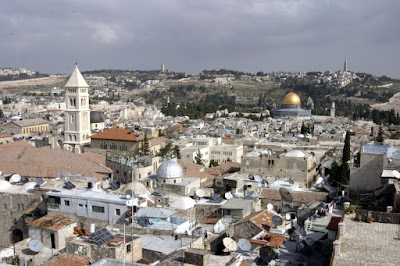Feb. 15, 2009: 6th Sunday Ordinary (B)
 I spent the past ten days in the Holy Land. Five of that I spent in the streets of Old City of Jerusalem. It is interesting to see how three different faiths and ethnicity--Christians, Jews, and Muslims--live and make their livelihood in an area less than half a square mile. Our guide told us that there were about 30,000 people living in an enclosed land that is less than the size of the land on which Mall of Louisiana and surrounding shops sit on. You can imagine it takes a bit of tolerance for each other to live shoulder to shoulder. Our guide also warned me that some religious persons may say something colorful or may spit on the side when they see a Catholic p
I spent the past ten days in the Holy Land. Five of that I spent in the streets of Old City of Jerusalem. It is interesting to see how three different faiths and ethnicity--Christians, Jews, and Muslims--live and make their livelihood in an area less than half a square mile. Our guide told us that there were about 30,000 people living in an enclosed land that is less than the size of the land on which Mall of Louisiana and surrounding shops sit on. You can imagine it takes a bit of tolerance for each other to live shoulder to shoulder. Our guide also warned me that some religious persons may say something colorful or may spit on the side when they see a Catholic p riest. That's nothing new, however. I have been cursed out in the Walmart parking lot on College wearing my collar before. Personally I was not aware of it happening to me, but six other parishioners of St. Aloysius who went on this trip with me said that they did notice it happening to me. I suppose it's natural for us to see one who is different from us as 'unclean,' to use the word from our First Reading and our Gospel. In our readings, we see what a person with leprosy is supposed to do according to the Jewish law. It says, "If the man is leprous and unclean, the priest shall declare him unclean." And "the one who bears the sore of leprosy shall cry out, 'Unclean, unclean!'" To some, I was an 'unclean' religious person of a different faith. There was nothing as powerful of emotion to be let known that I was different and unwanted from the larger community.
riest. That's nothing new, however. I have been cursed out in the Walmart parking lot on College wearing my collar before. Personally I was not aware of it happening to me, but six other parishioners of St. Aloysius who went on this trip with me said that they did notice it happening to me. I suppose it's natural for us to see one who is different from us as 'unclean,' to use the word from our First Reading and our Gospel. In our readings, we see what a person with leprosy is supposed to do according to the Jewish law. It says, "If the man is leprous and unclean, the priest shall declare him unclean." And "the one who bears the sore of leprosy shall cry out, 'Unclean, unclean!'" To some, I was an 'unclean' religious person of a different faith. There was nothing as powerful of emotion to be let known that I was different and unwanted from the larger community.In the old city of Jaffa near Tel Aviv, we celebrated mass at St. Peters Church. Acts Chapter 9 and 10 describe what happened to St. Peter as he stayed with Simon the Tanner. St. Peter received a vision in which he was told to slaughter and eat four-legged creatures, reptiles, and birds which descended from heaven. St. Peter protested,"Certainly not, sir. For never have I eaten anything profane and unclean."And the voice spoke to him again, a second time, "What God has made clean, you are not to call profane." When St. Peter wondered about what this meant, two servants of gentile Cornelius arrived to escort him. St. Peter baptized the entire gentile household of Cornelius. This was a lesson that in the plan of God, gentiles were also to receive the salvation promised to Jews. It was a sign that God's saving hand was reaching beyond our human barriers and discrimination.

It was interesting to see the vast number of Muslim and Jewish vendors lining up the Via Dolorosa or the streets that commemorate the Way of the Cross to sell Christian artwork and rosaries. In these streets, it was a disadvantage to wear my priestly collar. I got tugged in every shop, "Father, I'll give you a good deal!" I didn't know how to appear mean enough to stop unwanted solicitations. I suppose we can cross all sorts of human barriers and boundaries when money is involved. How did Jewish vendors feel about selling picture of Jesus in their shops? How about a Muslim vendor selling Pope's photos? When money was involved, we seemed to set aside our human categories; there seemed to be no distinction between what's clean and unclean. If we can cross boundaries because of money, we are certainly capable of crossing boundaries for more noble purpose--to love, as Jesus commanded us. In our Gospel, when a leper approached Jesus, Jesus did the unthinkable. He touched the leper and said, "I do will it. Be made clean."
So here is a challenge for us as Ash Wednesday and Lent are approaching in a week and a half. During Lent pick one person in our life that we have categorized as 'unclean' or untouchable. Make the effort during Lent to have the same attitude to that person as Jesus, "I do will it. Be made clean," remembering that St. Peter was told, "What God has made clean, you are not to call profane." At least make an effort to change our attitude.
